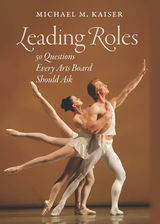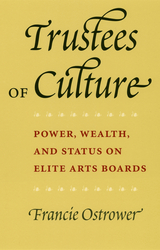2 books about Arts boards

Leading Roles
50 Questions Every Arts Board Should Ask
Michael M. Kaiser
Brandeis University Press, 2010
Not-for-profit arts organizations struggled to survive the recent economic recession. In this increasingly hardscrabble environment, it is absolutely imperative that the boards of these organizations function as energetically, creatively, and efficiently as possible. Michael M. Kaiser’s personal history with boards of arts organizations began when he served on the board of the Washington Opera (now the Washington National Opera) in 1983. Today, in his capacity as president of the John F. Kennedy Center for the Performing Arts, Kaiser recently completed a 50-state, 69-city Arts in Crisis tour. Board issues came up repeatedly as central to the success or failure of the organization. Drawing on these and many other conversations, nationally and internationally, Kaiser’s book offers members of boards and staffs the information they need to create the healthy atmosphere necessary to thriving arts organizations. Organized in a clear, readable, question-and-answer format, Leading Roles covers every aspect of board participation in the life of the organization, including mission and governance; fundraising and marketing responsibilities; the relationship of the board to the artistic director, executive director, and staff; and its responsibilities for planning and budgeting. Kaiser addresses boards in crisis, international boards, and boards of arts organizations of color. Throughout, he emphasizes the importance of transparency and clarity in the board’s dealings with its own members and those of the arts community of which it is a part, showing how anything less results in contentiousness that can immobilize an arts organization, or even tear it apart.
[more]

Trustees of Culture
Power, Wealth, and Status on Elite Arts Boards
Francie Ostrower
University of Chicago Press, 2002
Cultural trusteeship is a subject that fascinates those who wonder about the relationship between power and culture. What compels the wealthy to serve on the boards of fine arts institutions? How do they exercise their influence as trustees, and how does this affect the way arts institutions operate? To find out, Francie Ostrower conducted candid personal interviews with 76 trustees drawn from two opera companies and two art museums in the United States.
Her new study demonstrates that members of elite arts boards walk a fine line between maintaining their status and serving the needs of the large-scale organizations they oversee. As class members whose status depends in part on the prestige of the boards on which they serve, trustees seek to perpetuate arts boards as exclusive elite enclaves. But in response to pressures to increase and diversify the audiences for arts institutions, elite board members act in a surprisingly open manner in terms of organizational accessibility and operations.
Written with clarity and grace, Trustees of Culture will contribute significantly to our understanding of organizational governance; the politics of fundraising; elite arts participation and philanthropy; as well as the consequences of wider social policies that continue to emphasize private financial support. Ostrower's study will prove to be indispensable reading for not just sociologists of culture, but anyone interested in how the arts are financially and institutionally supported.
Her new study demonstrates that members of elite arts boards walk a fine line between maintaining their status and serving the needs of the large-scale organizations they oversee. As class members whose status depends in part on the prestige of the boards on which they serve, trustees seek to perpetuate arts boards as exclusive elite enclaves. But in response to pressures to increase and diversify the audiences for arts institutions, elite board members act in a surprisingly open manner in terms of organizational accessibility and operations.
Written with clarity and grace, Trustees of Culture will contribute significantly to our understanding of organizational governance; the politics of fundraising; elite arts participation and philanthropy; as well as the consequences of wider social policies that continue to emphasize private financial support. Ostrower's study will prove to be indispensable reading for not just sociologists of culture, but anyone interested in how the arts are financially and institutionally supported.
[more]
READERS
Browse our collection.
PUBLISHERS
See BiblioVault's publisher services.
STUDENT SERVICES
Files for college accessibility offices.
UChicago Accessibility Resources
home | accessibility | search | about | contact us
BiblioVault ® 2001 - 2024
The University of Chicago Press









